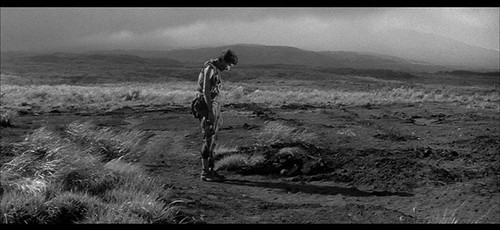 I wasn't able to find who first said it, but when dealing with history the line 'the winners get to write the history books' seem to get used a lot. Fair or not, it's true. In other words, you don't always get both sides of the story with the losers getting the short end of the stick. Think of WWII movies, not many have been made from the German and Japanese point of view. Of course the ones that have been made are held in high regard, most recently with Clint Eastwood's Letters from Iwo Jima and a few years earlier with Sam Peckinpah's 1977 movie Cross of Iron.
I wasn't able to find who first said it, but when dealing with history the line 'the winners get to write the history books' seem to get used a lot. Fair or not, it's true. In other words, you don't always get both sides of the story with the losers getting the short end of the stick. Think of WWII movies, not many have been made from the German and Japanese point of view. Of course the ones that have been made are held in high regard, most recently with Clint Eastwood's Letters from Iwo Jima and a few years earlier with Sam Peckinpah's 1977 movie Cross of Iron.When you compare those movies though, it was Americans making movies about the Japanese and Germans. It's always interesting to go right to the source as is the case with 1959's Fires on the Plain. Director Kon Ichikawa presents a story set in the closing days of WWII in the Philippines as the Allies make their final approaches to ending the war. It's a movie that doesn't even need the setting, but it certainly helps. 'Fires' could be seen and appreciated just as much as a post-apocalyptic film dealing with a remnant trying to survive so really the WWII setting just enhances the story and helps put it in perspective.
Returning to what's left of his company at the front line, Japanese Private First Class Tamura (Eiji Funakoshi) is ordered by his company commander to head back to the field hospital miles away. Tamura is dealing with tuberculosis which with his physical condition makes him worthless to his fellow soldiers at the front because he can't help forage for food and isn't strong enough to fight. So starts a journey through the war-torn wastelands as Tamura simply tries to survive.
Traveling alone, Tamura must not only look out for advancing American soldiers (should he surrender to the Yanks?) but also roaming groups of Philipino guerrillas and his own Japanese forces. In his efforts, Tamura finds the remnant of a once proud army that's now been reduced to walking zombies with little to nothing to eat trying to organize for one last fight on a coastal city. There's no organization, no officers trying to assemble the men into units, instead it's every man for himself. This scene shows just how bad off the surviving Japanese soldiers really are.
Along the way, Tamura meets any number of Japanese soldiers, some looking to continue the fight and willing to shoot anyone who isn't, others just looking for their next meal and drink of water. Two soldiers in particular keep popping up, Yasura (Osamu Takizawa), a non-commissioned officer always looking to make a trade for food with the few tobacco leaves he has remaining, and Nagamatsu (Mickey Curtis), a younger soldier under Yasura's thumb. Because they go in and out of the story, it's through their changes in appearance we see their weakening conditions.
This isn't a glorious, flag waving type of war movie, not by a long shot. The story is from the Japanese perspective almost completely, the American forces are only shown once or twice, but more importantly it's the idea of the Americans that is important to the story. Are they salvation for the ragtag Japanese forces or will they slaughter any remaining Japanese soldiers? Ichikawa films in black and white and shot the whole movie in Japan. And what makes it all so easily believable? The cast's commitment to shooting it realistically.
Ichikawa apparently didn't allow any of the cast to keep up their physical appearance, like brushing teeth and cutting finger and toe nails, even limiting the food intake of the cast. Funakoshi completely starved himself to help get into character, pushing himself to the point where he actually collapsed during filming and shut down production for almost two weeks. Because of this commitment, the movie feels real like you're there walking alongside Tamura. By the end of the movie, the characters look exhausted as if they were about to keel over for good so Ichikawa's insistence on no personal hygiene paid off in a big way.
For a movie with a no-holds barred anti-war message, the ending can be key because the whole thing can unravel if it doesn't work. There are two twists in the last 15, 20 minutes that work so perfectly. One has to do with the title, the fires on the plain, which one Japanese soldier explains is local farmers burning the husks of their plants from the harvest. The final line is a haunting one with Tamura pushed to his absolute limit with no regard for what happens to him anymore. The other twist shows how far these surviving Japanese soldiers have been pushed. It's not so much a twist as a surprise, but the revelation is startling no matter how you look at it.
Can't recommend this one enough. As a movie about Japanese soldiers made by a Japanese director, it's easy to see why this movie isn't exactly mainstream. And with the anti-war message, it's obviously not a story you walk away from with a smile on your face. So don't be scared away from Fires on the Plain, a WWII movie that needs to be seen.

No comments:
Post a Comment